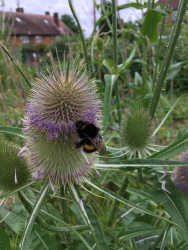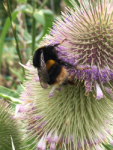“We may be an urban constituency, but we have beehives in Putney and we know how essential bees are for pollination. I am very concerned about the decision to use bee-killing neonicotinoid pesticides. I firmly believe they should be banned.”
Fleur Anderson


With all that’s happening you may not have noticed that the Government has agreed to allow the use of neocotinid pesticides this year – rolling back the EU legislation from 2018 banning these substances. Having just passed the Environment Bill, they then choose to set it aside.
A seed treatment to help sugar beet farmers sounds innocuous – until you understand that these extremely dangerous chemicals pass into every part of the plant -roots, stem, leaves, flowers -and persist in the soil afterwards, harming bees and pollinators for many years to come. They spread rapidly through water run-off contaminating wide areas. The science is devastatingly clear.
Research shows that neocotinoids also harm birds. Just two treated seeds (equivalent) eaten by a songbird makes them lose weight and delays migration, decreasing their chances of survival. (Science 2019)
Our President, Fleur Anderson, spoke in a parliamentary debate about this regrettable decision. See a clip of her speech here.
The Hansard record makes fascinating reading for those interested in this topic. Read the whole debate here: https://hansard.parliament.uk/
The virus disease problems experienced by our sugar beet farmers are real enough. The Government themselves have said that they expect the sugar beet industry to no longer rely on bee-killing neonicotinoids by 2023—next year—through the development of pest-resistant varieties and greater use of integrated pest management. Many farmers are working hard on alternative strategies. Sufficient support for the farmers to use alternative pest management could make this year’s devastation unnecessary.
Please be careful what you use on your plot. Our allotments should be a haven for our pollinators. This is a complex topic, but it has been shown that well diluted ionic surfactants (eco washing up liquid) are mostly harmless. Glyphosate is not. Try not to use it – it’s persistent in the soil. If it’s essential to use a tiny amount make sure the bees can’t get to it. ( Non-insecticide pesticide impacts on bees: A review of methods and reported outcomes/ Agriculture, ecosystems & Environment, 2021)
Read Fleur’s newsletter about this and other local issues here

